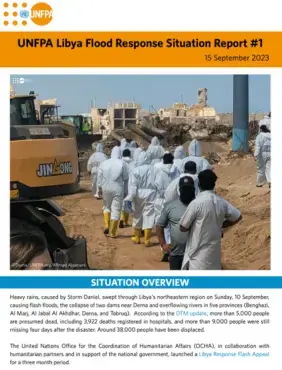Heavy rains, caused by Storm Daniel, swept through Libya's northeastern region on Sunday, 10 September, causing flash floods, the collapse of two dams near Derna and overflowing rivers in five provinces (Benghazi, Al Marj, Al Jabal Al Akhdhar, Derna, and Tobruq). According to the DTM update, more than 5,000 people are presumed dead, including 3,922 deaths registered in hospitals, and more than 9,000 people were still missing four days after the disaster. Around 38,000 people have been displaced.
The United Nations Office for the Coordination of Humanitarian Affairs (OCHA), in collaboration with1 humanitarian partners and in support of the national government, launched a Libya Response Flash Appeal for a three month period.
More than 880,000 people in the five hardest-hit provinces, including 440,000 women, were affected by the disaster with more than 40,000 displaced people. The cities of Derna, Battah, Soussa, Al Marj, Taknis, Al Bayda, Shahat, Al Bayadah, Tolmeita, Tokra, Al Abyar and Bersis are among the worst affected and schools and hotels are being used for shelter. Telecommunications and electricity outages combined with road collapses are making access to information extremely challenging.
Both the Foreign Affairs Committee of the Libyan House of Representatives and the Presidential Council have requested international assistance.
UNFPA estimates that up to 230,000 of the people in need of humanitarian assistance are women and girls of reproductive age (15 to 49 years) among whom an estimated 24,000 women are pregnant and in need of essential sexual and reproductive health (SRH) services, including basic and comprehensive emergency obstetric and neonatal care (B/CEmONC). Around 2,625 pregnant women among the people in need of humanitarian assistance are expected to give birth in the next month.
An increased number of women are exposed to risks of gender-based violence (GBV) and sexual exploitation and abuse (SEA) as women and girls are on the move, displaced in temporary shelters and deprived of basic needs. Gender-based violence was already a critical issue for women and girls in Libya prior to this crisis.


